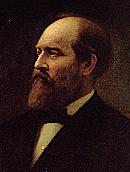



On July 2, 1881, two shots were fired into the back of President Garfield as he walked through the waiting room of the Baltimore and Potomac depot in Washington. The president lingered for seventy-nine days, succumbing finally on September 29. The assassin, a megalomaniac politician named Charles Julius Guiteau, had been disappointed at not getting the consulship he expected as the reward for a speech written during Garfield's campaign. Guiteau pleaded insanity at his noisily sensational trial, but was found guilty and hanged in the early afternoon of June 20, 1882. The ugly revelations of political jobbery made during Guiteau's trial are credited by the historian Charles Beard with having prompted the creation of the Civil Service Commission.Guiteau's goodnight is based on a New York broadside, "The Lamentation of James Rodgers," a murderer executed on November 12, 1858....
A popular goodnight of the 1870s, "My Name It Is John T. Williams," also borrowed lines and motives from the Rodgers piece. Writers unfamiliar with the goodnight conventions have suggested that Guiteau himself wrote the ballad bearing his name. It happens that Guiteau did write verses in prison, but they were more religiose and belligerent than the ballad that keeps his notoriety alive. No broadside copy of "Charles Guiteau" survives, though such a sheet may well have been the ancestor of the versions collected from oral tradition in the South and Midwest.


Come all you tender Christians, wherever you may be,
And likewise pay attention to these few lines from me.
For the murder of James A. Garfield I am condemned to die
On the thirtieth day of June, upon the scaffold high.CHORUS:
My name is Charles Guiteau, my name I'll ne'er deny.
I leave my aged parents in sorrow for to die.
But little did they think, while in my youthful bloom,
I'd be taken to the scaffold to meet my earthly doom.'Twas down at the station I tried to make my escape,
But Providence being against me, there proved to be no show.
They took me off to prison while in my youthful bloom
To be taken to the scaffold to meet my earthly doom.I tried to [play off] insane but found it ne'er would do,
The people were all against me, to escape there was no clue.
Judge Cox, he read my sentence, his clerk he wrote it down,
I*d be taken to the scaffold to meet my earthly doom.My sister came to see me, to bid a last farewell.
She threw her arm around me and wept most bitterly.
She says, "My darling brother, this day you must cruelly die
For the murder of James A. Garfield, upon the scaffold high."


